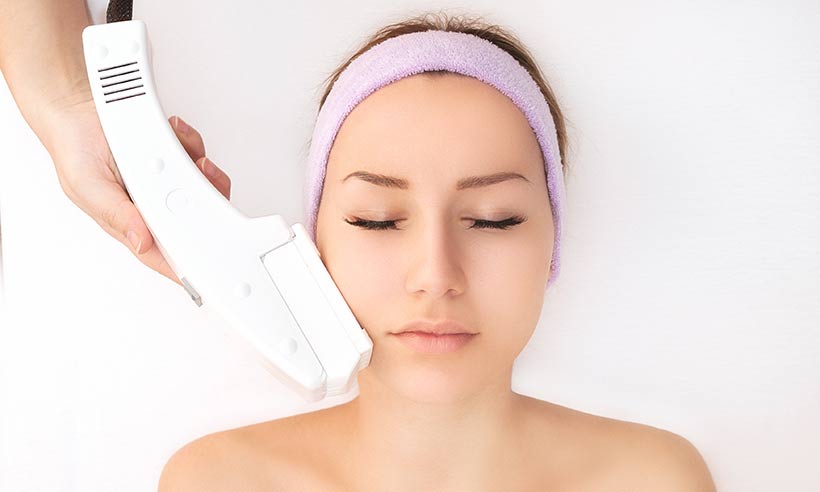Exfoliation is essential to a healthy and glowing skin. It improves your skin tone and helps unclog oil from your pores so that you don’t get acne breakouts.
While exfoliation deserves a special place in your skincare routine, it doesn’t get that much attention. Exfoliation may be time-consuming, but it is the fastest way to bring out your best natural beauty.
What most women know about exfoliation is that it requires scrubbing your skin with a product to remove dead skin cells, a process that takes time.
As it turns out, there are two types of exfoliation that exist: mechanical and chemical. Learning the difference between the two and choosing one that suits your skin will help you get optimal results.

Mechanical Exfoliation
What is mechanical exfoliation?
Mechanical exfoliation or physical exfoliation involves the use of a tool like a facial brush or a face scrub. A circular motion is required for mechanical exfoliation as this helps loosen dead skin cells.
You can exfoliate at home or the salon. If you do it by yourself, always proceed with care because there are products such as scrubs with ingredients and textures that may cause an adverse reaction in your skin.
Does it work for all skin types?
In general, mechanical exfoliation works well for all skin types. However, to prevent micro-tears in your skin from happening, it’s best to choose a scrub that doesn’t have large granules. Micro-tears are tiny abrasions on your skin that result from too much scrubbing or using the wrong product.
Sugar-based scrubs such as the Black Sugar Mask Wash Off from Skinfood are a good option since the grainy sugar granules tend to be gentler than other popular scrub ingredients like salt and nut shell granules. Sugar is also a known humectant, meaning it helps preserve the moisture on skin. With sugar scrubs, you get the consistency and texture your skin is most comfortable with, preventing irritation while sloughing off dead skin cells and allowing the absorption of nutrients.
What if I have inflamed acne?
If you have inflammatory acne, consult a dermatologist first. This also applies to those affected by dermatitis or eczema. Your dermatologist may prohibit specific scrubs that could aggravate your skin condition rather than treat it.
Tips when doing mechanical exfoliation
- Do not exfoliate a sunburn, cut, or wound
- After a mechanical exfoliation, make sure to hydrate your skin with a moisturizer
- Apply the exfoliator or scrub using gentle, circular motions
- Exfoliate no more than two to three times a week
- Pay attention to redness or flaking. These are signs of excessive scrubbing.
Chemical Exfoliation
What is chemical exfoliation?
The second option you should consider is chemical exfoliation. This method of exfoliation is an excellent alternative to the mechanical type if your goal is to shed off dead skin cells.
Chemical exfoliation is stronger because it penetrates into the deeper layers of the skin. At the same time, it is gentler in that it doesn’t require physical force which may cause micro-tears on the skin when done excessively.
Is chemical exfoliation harmful?
The word “chemical” may scare some people, but contrary to what some women may think, chemical exfoliation is pretty safe. In fact, these exfoliants actually contain ingredients from natural sources such as fruits, plants, and sugars. Two kinds of chemical exfoliants you should consider are AHAs and BHAs.
What are AHAs and BHAs and how do they differ?
You’ve probably heard of AHAs and BHAs but are not sure what they mean. These are two ingredients that are common in chemical exfoliation products.
- AHAs (Alpha hydroxy acids)– AHAs have an exfoliative effect on the skin, which promotes the surfacing of new skin cells. These acids are water soluble and have the ability to preserve and enhance skin moisture while also increasing collagen production. AHAs work best on dry and normal skin types.
- BHAs (Beta hydroxyl acids)– You’ve most likely heard of salicylic acid, the peeling agent in pimple-fighting products. This is a common BHA. BHAs work on your skin by unclogging pores of oil and dirt, as well as penetrating more deeply into the skin compared to AHAs. Because they are oil soluble, BHAs are preferred for oily skin types.
Take note that it is safe for you to use AHAs and BHAs together. You can apply them at about the same time (AHA first, then BHA after a few minutes), or you can use them on alternate days. Another tip would be to apply one kind of chemical exfoliant in the morning and another kind at night.
Is there such as thing as “over-exfoliation” in chemical exfoliation?
Yes, there is. Your skin’s reaction depends on how frequent you exfoliate, the potency of the product, and any existing skin conditions.
Usually, personal experience will help you figure out the best times and products for chemical exfoliation. But as always, don’t forget to consult a dermatologist.
Tips when doing chemical exfoliation
- Avoid scratching or picking your skin to prevent scarring
- Pay attention to how your skin responds to AHA and BHA exfoliators
- Do not exfoliate daily since this promotes inflammation which accelerates the aging process
- Use AHAs and BHAs as directed; Read the labels
- Discontinue the use of a chemical exfoliant if you experience a prolonged burning sensation
Conclusion
Have you decided on the exfoliation method that’s right for you? No matter what skin care routine you are following today, don’t put exfoliation aside. It’s one of the best ways to revive your skin so that it glows all day.
Exfoliate safely!
